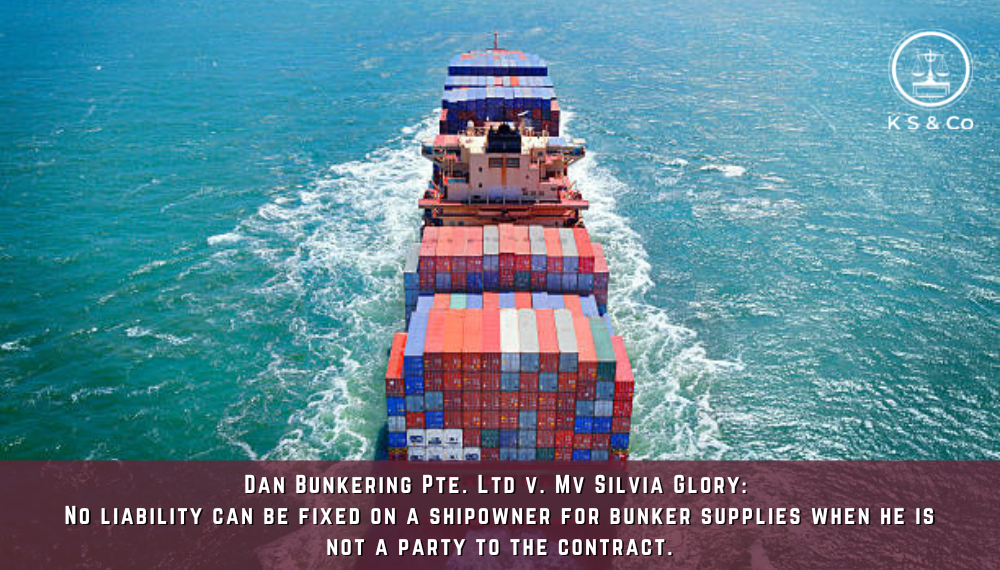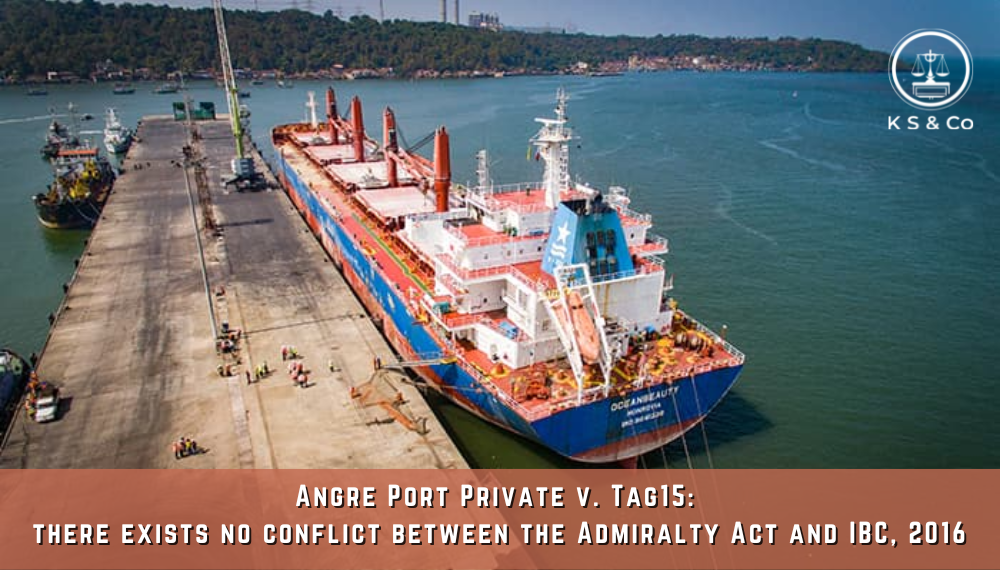Facts of the case:
The plaintiff sought a summary judgement of INR 93,719,098 against the first defendant vessel, Tag 15, for port charges, berth hire charges, penal berth hire charges, salvage operations, and mooring crew charges. The original suit was only filed against the vessel. Sudip Bhattacharya was appointed as liquidator and was added as the second defendant after the vessel’s owner, Tag Offshore Ltd, went into liquidation.
On February 13, 2019, the vessel arrived at the plaintiff’s port and began occupying berth space. EXIM Bank Ltd, a secured creditor of Tag Offshore Ltd, arrested the vessel on March 4, 2019. RH Petroleum Ltd initiated insolvency proceedings against Tag Offshore Ltd on April 24, 2019, in accordance with Section 9 of the Insolvency and Bankruptcy Code 2016 (IBC). The crew abandoned the vessel on May 7, 2019. The vessel began drifting away from the plaintiff’s berth on June 16, 2019, due to strong winds and currents caused by the monsoon. The vessel floated away after breaking its mooring rope, posing a serious threat to the port, its navigational channels, and the nearby village. The plaintiff immediately hired and dispatched a nearby tug, the Shambhavi, to salvage the vessel and return it to safe harbour. Tag Offshore Ltd was dissolved on September 26, 2019. The plaintiff had the vessel arrested on January 20, 2020. The liquidator filed an interim application on January 28, 2020, seeking modifications/recall of the arrest order. The Court granted the liquidator limited relief in an order dated January 29, 2020, allowing him to sell the vessel subject to certain terms and conditions. He was, however, unable to do so.
The plaintiff filed an interim application for judicial sale of the vessel on February 26, 2020. The reason for the sale was that there was a high risk of deterioration of the vessel, which had been lying unscrewed for a long time, and the plaintiff’s maritime lien would be jeopardised. Finally, on July 9, 2020, the Court ordered the vessel to be sold. The Court confirmed the sale of the vessel to JT Marine Services Pvt Ltd for INR 107,500,000 on September 22, 2020.
The defendants argued, among other things, that the plaintiff’s admiralty suit was barred by res judicata – the plaintiff had already filed its claim before the liquidator of Tag Offshore Ltd, and thus was not entitled to bring the same claim again.
Issue:
- Whether this Suit is maintainable?
- Whether the Suit is being barred by the principles of Res Judicata?
- Whether the “Penal Berth Hire charges” are in the nature of penalty?
Held:
The proviso to Section 33(5) of IBC, 2016, states that the liquidator may institute a suit or other legal proceeding on behalf of the corporate debtor with the prior approval of the adjudicating authority. When reading Section 33(5), it is clear that the provision only prohibits the filing of a suit or other legal proceeding against the corporate debtor. It does not preclude the institution of a suit or other legal proceeding against a ship owned by the corporate debtor when the Court invokes its admiralty jurisdiction. The Admiralty (Jurisdiction and Settlement of Maritime Claims) Act 2017 treats the vessel as a separate legal entity that can be sued without involving the vessel’s owner in the proceedings. The Admiralty Act action against the vessel is an action in rem, and a decree can be sought against the vessel without suing the owner. The purpose of an action in rem against the vessel is to enforce the maritime claim against the vessel and recover the amount of the claim from the vessel through an admiralty sale and payment from the sale proceeds. The vessel is responsible for paying the claim. This is the fundamental premise of an in rem action. The owner’s presence is not required for the plaintiff’s claim to be heard. Because of this, there is no requirement to serve the writ of summons on the owner of the vessel, and service of the warrant of arrest on the vessel is sufficient.
The second argument, that the plaintiff’s suit is barred by res judicata principles, proceeded on the basis that there is no qualitative difference between the claim made against the corporate debtor and the claim made against the vessel because they are based on the same cause of action. This argument is incorrect in light of the decision in Raj Shipping Agencies v. Barge Madhwa & Anr (2020 SCC Online Bom 561), in which this Court clearly distinguished between a claim made against the vessel (in this case, the corporate debtor Tag Offshore Ltd), which is an action in rem, and a claim made against the owner of the vessel (in this case, the corporate debtor Tag Offshore Ltd), which is a claim in personam.
The third argument was that the Penal Berth Hire charges that the 1st Defendant Vessel would incur were specified in the Plaintiff’s Tariff Booklet. It was undisputed that once Tag Offshore Ltd. engaged the Plaintiff’s services for the first Defendant Vessel, it would be contractually obligated to pay for those services in accordance with the Plaintiff’s Tariff Booklet. After reading the Tariff Booklet, it was clear that the Penal Berth Hire charges were not penal in nature, but rather additional charges that the Vessel would incur in the event of an emergency. It was determined that once the 1st Defendant Vessel contractually agreed to pay these additional charges, Defendant No.2 could not resile from this contractual obligation. While adjudicating the Plaintiff’s invoice dated October 17, 2019, the Court also noted that Defendant No. 2 understood Penal Berth Hire charges as additional charges rather than a penalty. When Defendant 2 adjudicated the said invoice, he accepted all charges except the salvage costs/operations. The Court determined that once Defendant No. 2 accepted that these amounts were payable to the Plaintiff, he could no longer argue that the Plaintiff was not entitled to any Penal Berth Hire Charges and that they were penal in nature. The fact that the Defendant No. 2 made a statement before the Court on 9 March 2020 that there was no dispute regarding Berth charges and Port charges, was a determining factor when deciding the issue.
K S&CO Comments:
This is an important case as it draws a distinction between insolvency proceedings, which is an action in personam, and an admiralty action, which is a suit in rem against the vessel. It also clarifies that the adjudication of claims by the liquidator under IBC, 2016 cannot function as res judicata qua the admiralty suit filed by a creditor against the vessel. The Bombay High Court’s judgement is also significant because it clarifies that “berth hire charges” are only additional charges contractually agreed between the parties, and cannot be classified as a penalty. Thus, a party claiming such charges would not have to prove the said charges as damages under Section 74 of the Indian Contract Act, 1872.







Leave a Reply